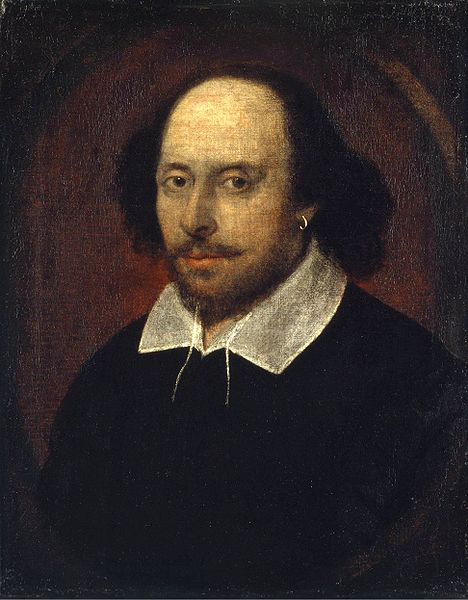April 23: William Shakespeare
William Shakespeare (1564)
It was on this date, April 23, 1564, that the greatest poet and playwright in the English language, William Shakespeare, was baptized, so this is taken as his birthday. He is known to be the author of about 38 plays, 154 sonnets, two long narrative poems, and several other poems. His plays are performed more often than those of any other playwright and have been translated into every major living language. Because few records of Shakespeare's private life survive, scholars have freely speculated about his physical appearance, sexuality, religious beliefs, and whether some or all of the works attributed to him were written by others.
For example, though he is claimed by every religious persuasion, we cannot definitively say that Shakespeare was a skeptic or a believer. The careful reader will admire Shakespeare's ability to make pagans behave and speak as one would expect, and Christians, too. He certainly had ample opportunity to take religious turns in his dramas and comedies, and especially in his history plays, but he does not. What truly religious sentiments Shakespeare does exhibit, have no depth, as if he were either indifferent to, or ignorant of, the theology of the Elizabethan Age.
Contrast this opening line from Shakespeare's will: "I commend my soul unto the hands of God my Creator, hoping, and assuredly believing through the merits of Jesus Christ, my Savior, to be made partaker of life everlasting," which bears not a hint of the wit in lines from his plays, such as, "His worst fault is, he's given to prayer; he is something peevish that way" (Mistress Quickly, Merry Wives of Windsor, 1:4), or this "Modest doubt is called the beacon of the wise" (Hector, Troilus and Cressida, 2:2), or this "It is an heretic that makes the fire, not she which burns in it" (Paulina, The Winter's Tale, 2:3).
Whereas scholars such as William Birch of Oxford University suggested (1848) The Bard may have been an atheist, based on such quotations from his works, this conclusion was never taken seriously. Still, even the Catholic Encyclopedia wonders if “Shakespeare was not infected with the atheism, which, as we know from the testimony of writers as opposite in spirit as Thomas Nashe and Father Persons, was rampant in the more cultured society of the Elizabethan age.” Other scholars note Shakespeare's absence at church services, which could have gotten him into great trouble in Elizabethan London.
Shakespeare’s religion, like other details of his lightly documented life, remains an open question. All we can say with certainty is that, in a time when it was a serious offense to be an unfaithful Christian – note the suspicion which fell on Christopher Marlowe – and to skip church services, William Shakespeare said some things no Christian should have said and failed to do some that a Christian should have done.
Originally published April 2003 by Ronald Bruce Meyer.


